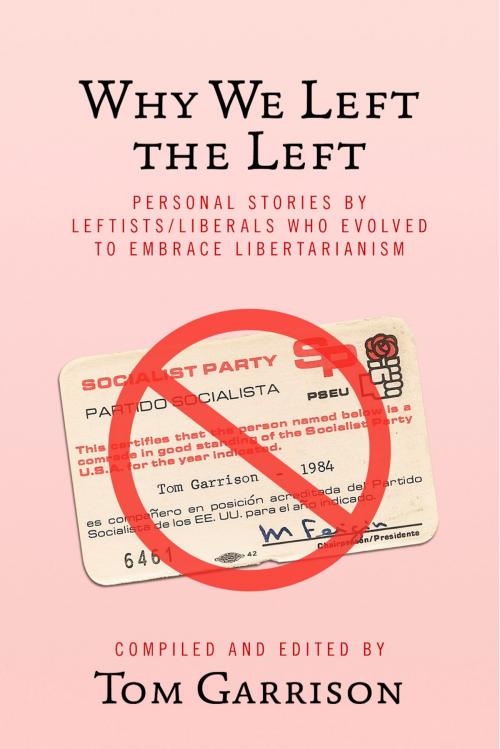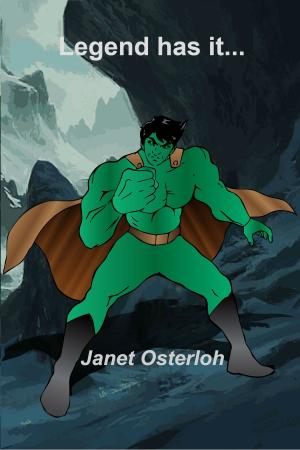Why We Left the Left
Personal Stories by Leftists/Liberals Who Evolved to Embrace Libertarianism
Nonfiction, Social & Cultural Studies, Political Science| Author: | Tom Garrison | ISBN: | 9781623092368 |
| Publisher: | BookBaby | Publication: | January 1, 2001 |
| Imprint: | Language: | English |
| Author: | Tom Garrison |
| ISBN: | 9781623092368 |
| Publisher: | BookBaby |
| Publication: | January 1, 2001 |
| Imprint: | |
| Language: | English |
One political question intrigues almost everyone who studies, participates, or is interested in politics: “Why do people identify with a certain ideology and/or political party?” Numerous scholarly and popular books examine political ideology/party identification and why certain ideologies attract certain individuals. This book examines that question in two separate, yet joined phases. Why do people initially identify with the Left/liberalism and why do these same individuals abandon that ideology to evolve into libertarians? This inquiry is unique in its focus on former liberals/leftists who become libertarians. Included are 23 stories from Americans and one Irishman, baring at least part of their souls to answer these questions. All contributors at one point identified with the Left/liberalism. Each explains what originally drew them to the left part of the political spectrum. Virtually all mention some version of the popular stereotype of liberals/leftists “caring for the average person.” And all came to see that as a wispy apparition, based more on intention than fact. A common theme for why the liberals/leftists abandoned their ideology is the ugly discovery of the inherent elitism of leftists/liberals. Over and over in these stories, the contributors give examples of their liberal/leftist “comrades” explaining how they (liberals/leftists) are needed to steer the people in the proper direction, for their own good of course. The true believing leftists/liberals cling to this illusion. Through many different paths, the contributors to this volume come to see the anti-democratic, elitist nature of this belief. An equally common denominator is the lack of respect for, or even acknowledgement of, personal responsibility in ones behavior. A core value of the Left/liberalism is victimhood. Everyone—women, gays and lesbians, people of color, public employee union members, the working class, and so on—is an actual or potential victim. As such, any dysfunctional behavior can always be excused as the result of societal oppression, racism and sexism, rich people and capitalists, corporations, “the man”, and on and on. Of course, negative external forces do exist, but they are not always (or even most of the time) the cause of crappy behavior or failure. Many of the stories in this book note that this refusal to acknowledge personal responsibility strongly influenced the contributor to turn away from the Left/liberalism. Of course, disillusionment with the notion that government action is needed for every problem—real or imagined—is inherent in turning from leftism/liberalism to libertarianism. Many contributors expound upon this theme. Many contributors also cite the power of classical liberal economic theory—truly free markets—as a factor in their leaving the Left. Real world examples of the failure of socialist/welfare state economic policy became too difficult to ignore. Finally, a minor, yet telling, theme is the lack of humor or playfulness in liberals and the Left. Several contributors note the feeling of liberation once they rejected the dour self-importance of the Left/liberalism. One popular conception of libertarians is that they are, for the most part, disgruntled old white guys. While that group is represented, more than 25 percent of the stories are from women and more than two-thirds are by people younger than 50. This gender and generational diversity extends to occupations—contributors include college students, law students, an attorney, a professional artist, public school teachers, a chemist, writers, a filmmaker, a law professor, a stay-at-home mom, a firefighter, the CEO of a $40 million company, a TV reporter, an editor, the CEO of a free market think tank, and a research engineer. It is my fervent hope that this collection of stories will hasten the day when libertarianism is widely recognized for what it is—the political movement for adults.
One political question intrigues almost everyone who studies, participates, or is interested in politics: “Why do people identify with a certain ideology and/or political party?” Numerous scholarly and popular books examine political ideology/party identification and why certain ideologies attract certain individuals. This book examines that question in two separate, yet joined phases. Why do people initially identify with the Left/liberalism and why do these same individuals abandon that ideology to evolve into libertarians? This inquiry is unique in its focus on former liberals/leftists who become libertarians. Included are 23 stories from Americans and one Irishman, baring at least part of their souls to answer these questions. All contributors at one point identified with the Left/liberalism. Each explains what originally drew them to the left part of the political spectrum. Virtually all mention some version of the popular stereotype of liberals/leftists “caring for the average person.” And all came to see that as a wispy apparition, based more on intention than fact. A common theme for why the liberals/leftists abandoned their ideology is the ugly discovery of the inherent elitism of leftists/liberals. Over and over in these stories, the contributors give examples of their liberal/leftist “comrades” explaining how they (liberals/leftists) are needed to steer the people in the proper direction, for their own good of course. The true believing leftists/liberals cling to this illusion. Through many different paths, the contributors to this volume come to see the anti-democratic, elitist nature of this belief. An equally common denominator is the lack of respect for, or even acknowledgement of, personal responsibility in ones behavior. A core value of the Left/liberalism is victimhood. Everyone—women, gays and lesbians, people of color, public employee union members, the working class, and so on—is an actual or potential victim. As such, any dysfunctional behavior can always be excused as the result of societal oppression, racism and sexism, rich people and capitalists, corporations, “the man”, and on and on. Of course, negative external forces do exist, but they are not always (or even most of the time) the cause of crappy behavior or failure. Many of the stories in this book note that this refusal to acknowledge personal responsibility strongly influenced the contributor to turn away from the Left/liberalism. Of course, disillusionment with the notion that government action is needed for every problem—real or imagined—is inherent in turning from leftism/liberalism to libertarianism. Many contributors expound upon this theme. Many contributors also cite the power of classical liberal economic theory—truly free markets—as a factor in their leaving the Left. Real world examples of the failure of socialist/welfare state economic policy became too difficult to ignore. Finally, a minor, yet telling, theme is the lack of humor or playfulness in liberals and the Left. Several contributors note the feeling of liberation once they rejected the dour self-importance of the Left/liberalism. One popular conception of libertarians is that they are, for the most part, disgruntled old white guys. While that group is represented, more than 25 percent of the stories are from women and more than two-thirds are by people younger than 50. This gender and generational diversity extends to occupations—contributors include college students, law students, an attorney, a professional artist, public school teachers, a chemist, writers, a filmmaker, a law professor, a stay-at-home mom, a firefighter, the CEO of a $40 million company, a TV reporter, an editor, the CEO of a free market think tank, and a research engineer. It is my fervent hope that this collection of stories will hasten the day when libertarianism is widely recognized for what it is—the political movement for adults.















